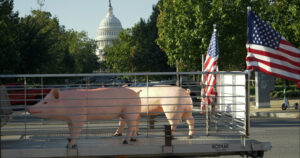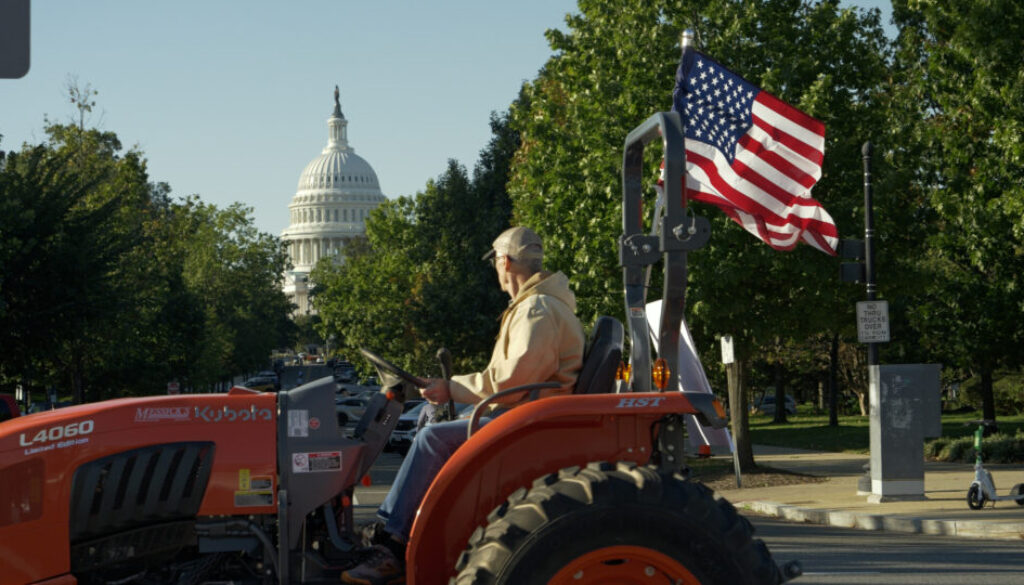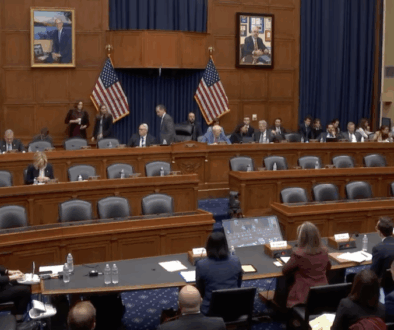Farmers fight federal efforts to block states from promoting humane animal agriculture
Listen to the audio version of this article (generated by AI).
A coalition of family farmers and meat companies gathered in the nation’s capital this week to fight federal efforts aimed at blocking state laws that promote humane, crate-free treatment of livestock.
With a tightly confined artificial pig as a prop, the farmer group met with members of Congress and spoke at the National Press Club about their efforts to defend expanding animal welfare practices seen in multiple US states.
“Consumers want the bacon on their breakfast table to be both delicious and raised with intention,” Kelly Hilovsky, senior manager of social and environmental responsibility for the meat seller ButcherBox, said Wednesday as the farmers convened at the National Press Club.

Large industrial farming groups are opposed to the state animal welfare measures, saying they complicate interstate trade and translate to added costs for producers and consumers, and the powerful groups have garnered support from Republican lawmakers and the Trump administration.
One key battlefront is a California measure, known as Prop 12, that requires veal calves, breeding pigs, and egg-laying hens to be housed in cage-free systems that provide specific amounts of space per animal, allowing them the ability to lie down, stand up and turn around. The measure outlaws the use of “gestation crates” for pregnant pigs, which severely restrict the animals’ ability to move.
The law also bans the sale of pork, eggs and veal from animals kept in spaces that fail to meet the minimum size requirements.
Prop 12 was passed by California voters in 2018 but did not take effect until January 2024 due to legal challenges from the National Pork Producers Council and the American Farm Bureau Federation.
A similar law in Massachusetts passed in 2016, and was also unsuccessfully challenged in court by large industrial agriculture interests.
This summer, the US Department of Justice (DOJ) lodged its own fight against the California measure, asserting that California’s rules prevent farmers nationwide from “using common production methods”. The law will add to higher food prices, according to the DOJ.
In July, House Republicans proposed the Save Our Bacon Act, preventing states from implementing their own standards for how out-of-state animals used to produce meat or eggs are raised. The Senate in April proposed a similar measure, the Food Security and Farm Protection Act. Supporters say the laws are needed to protect interstate commerce and prevent a patchwork of regulations that vary by state.
In a statement announcing the legislation, US Sen. Joni Ernst of Iowa said California’s measure is “dangerous” and jeopardizes the “nation’s food security”.

Brent Swart, a farmer and president of the Iowa Soybean Association, said in a related April statement that increased costs of compliance threaten to put pork farmers out of business and drive higher prices for consumers.
Prop 12 opponents point to recent data from the US Department of Agriculture (USDA) they say shows the California law drove up retail pork prices in that state by almost 19% in June 2025 compared with the same month in 2024.
But the family farmers and small meat companies supporting the animal welfare laws say they bolster businesses and win consumers’ trust.
Brent Hershey, a sixth-generation farmer who raises pigs in Pennsylvania for a multi-state meat distributor, said his operation is “living proof” that Proposition 12 doesn’t hurt farmers., He has chosen to stop using gestation crates, a feature of the California law, with little downside for his operation, saying the practice is being phased out in the pork industry.
“We’re trying to have Congress understand that there’s this huge group of family farmers who are for Prop 12, it’s been a good step for them,” he said. “We do not want Congress to roll it back and destroy that market.”
Several hundred state and local laws could be nullified if the new federal legislation becomes law, according to Humane World for Animals. The USDA estimates that about 27% of US pork producers are now Prop 12-compliant.
The federal efforts against the states measures follow several failed attempts to preempt state standards on farm animals and meat products, including the 2023 “Ending Agricultural Trade Suppression Act” (EATS Act) and the 2018 King Amendment, neither of which made it into a Farm Bill.
“We stand at a crossroads,” said ButcherBox’s Hilovsky. “One path upholds a system in which the cheapest production methods win, regardless of the consequences to our health, the wellbeing of the animals, farmer livelihoods and rural economies. The other path leads to a more resilient, humane and nutritious system.”
(Featured photo provided by the American Meat Producers Association.)





October 11, 2025 @ 12:23 am
I was there and learned so much about the way Congress works. But I couldn’t understand why so many Republicans were on the side of big agriculture and not on the side of small farmers and ranches. I thought they were the party of small government yet they want this government overreach and they are against state rights on this subject. Very hypocritical compared to, for example, abortion access….. then Republicans are on the side of states rights. But in agriculture they’re not. They want to support the big corporations (many from China and Brazil ) that sell meat to Walmart and is very poor quality, riddled with diseases and full of antibiotics. Yuck. Not healthy. What about MAHA??